St. Anne’s
What do we believe?
Our faith rooted in scripture, seasoned by tradition and flavored with reason is centered on worship submitting ourselves to God revealed as Father, Son, and Holy Spirit. We are a historic parish in The Episcopal Diocese of Maryland of The Episcopal Church and part of an international fellowship of 80 million believers called the Anglican Communion. Our parish was founded as the Middle Neck Parish of the Church of England in 1692.
We believe in following the teachings of Jesus Christ, whose life, death, and resurrection saved the world. We give our heart to Jesus and underscore the values of our faith as expressed through belief in the Historic creeds (Nicene and Apostles) of the Church as accurate representations of the essence of the Christian faith, and in the Thirty-Nine Articles of the Anglican Church as a coherent and concise expression of Anglican doctrine.
We have a legacy of inclusion, aspiring to tell and exemplify God’s love for every human being; women and men serve as bishops, priests, and deacons in our church. Laypeople and clergy cooperate as leaders at all levels of our church. Leadership is a gift from God and can be expressed by all people in our church.
For a full, yet concise, articulation of believe we invite you to pick up a copy of the Book of Common Prayer, 1979 (https://www.bcponline.org/) and read through the section entitled ‘An Outline of the Faith’ commonly called the Catechism.
The Bible
The Thirty-Nine Articles relates that “Holy Scripture contains all things necessary to salvation.” The Scriptures, comprised of the Old and New Testament, as well as some apocryphal texts, were written under the inspiration of the Holy Spirit. Scripture is the cornerstone of worship in The Episcopal Church tradition. During the Daily Officers and during The Eucharist (Holy Communion, The Mass, The Last Supper) the congregation will usually hear at least three readings from Scripture. Much of the liturgy from our Book of Common Prayer is based explicitly on the Biblical texts. Our Outline of Faith suggests that “we understand the meaning of the Bible by the help of the Holy Spirit, who guides the Church in the true interpretation of the Scriptures” (p. 853-4)
The Book of Common Prayer
Our liturgical services are based on the Book of Common Prayer (1979). The Book of Common Prayer (BCP)has its genesis in the 1549 Book of Common Prayer compiled from ancient Christian sources read through the Protestant Reformation by Archbishop Thomas Cranmer. It is only a symbol of our unity in the midst of diversity. Episcopalians are diverse in terms of our cultural, racial, socio-economic background and political positions. What unifies us in worship is our theology as articulated by the BCP.
The Creeds
Derived from the Latin “credo,” the creeds are statements of our basic beliefs about God. There are many ways to understand “belief.” Some understand the word to mean intellectual assent, others understand the word to mean “to give one’s heart to.” While we will always have and should have questions about God, the Church, and our own faith, two foundational creeds that we use during worship give us a lens through which we ground our faith. First, the Apostles’ Creed. The Apostles’ Creed is used at baptism and daily worship. The second is the Nicene Creed technically known as the Niceno-Contantinopolitan Creed. The creed was finalized during the second Ecumenical Council at Constantinople in 381 bc. It is a fourth century affirmation of faith in the Trinitarian nature of God. It is a corporate statement of the church ("We believe") which is why it is used at the Eucharist. In reciting and affirming these creeds, we join Christians across the world and throughout the ages in affirming our faith in the one God who created us, redeemed us, and sanctifies us.
Baptism
In the waters of baptism, we are lovingly adopted by God into God’s family, which we call the Church, and given God’s own life to share and reminded that nothing can separate us from God’s love in Christ. Holy Baptism, which can be performed through pouring of water or immersion in it, marks a formal entrance to the congregation and wider Church; the candidates for the sacrament make a series of vows, including an affirmation of the Baptismal Covenant, and are baptized in the Name of the Father, Son, and Holy Spirit. They are marked as Christ’s own forever, having “clothed [themselves] with Christ” (Galatians 3:27). All people of any age are welcome to baptized; we believe in one baptism for the forgiveness of sins, as the “bond which God establishes in Baptism is indissoluble” (Book of Common Prayer, p. 298). Holy Chrism is used to seal the baptized with the seal of the Holy Spirit. When chrism is used, the baptized is “Christened.”
Holy Communion
Holy Communion is known by various names: the Eucharist (which literally means "thanksgiving"), the Lord’s Supper, and the Mass. In essence, this is the sacred family meal for Christians and a foretaste of the heavenly banquet. All persons who have been baptized in the name of the Father, Son, and Holy Spirit are part of the extended family that is the Church. In other words, in Christ, we are all sisters and brothers. By virtue of your baptism, you are welcome to receive the bread and wine, and be in communion with God and each other. Yet, before coming to Receive Jesus in the sacrament, we should examine our lives, repent of our sins, and intend be in love and charity of with all people; putting away the malice of evil and leavening ourselves with the Bread (Body) of life.
